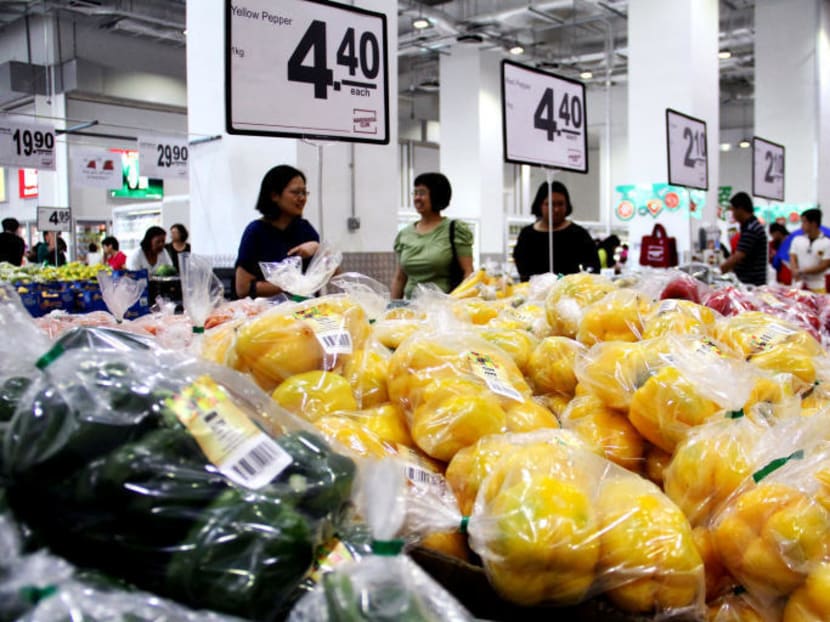Healthy eating need not be expensive: Chee Hong Tat
SINGAPORE — One does not have to spend more money in order to have a healthy diet, Senior Minister of State for Health Chee Hong Tat told Parliament on Tuesday (Oct 3), pointing out that eating in moderation and preparing food by steaming instead of deep frying could similarly produce the desired results.

“There are ways to eat healthily without buying expensive food,” the minister said in response to a question posed by Member of Parliament Chong Kee Hiong (Bishan-Toa Payoh GRC), on why consumers are charged more for healthy food, which require less processing, than unhealthy ones. TODAY file photo
SINGAPORE — One does not have to spend more money in order to have a healthy diet, Senior Minister of State for Health Chee Hong Tat told Parliament on Tuesday (Oct 3), pointing out that eating in moderation and preparing food by steaming instead of deep frying could similarly produce the desired results.
Singaporeans can also opt for food with less oil and salt, or drinks with less or no sugar.
“There are ways to eat healthily without buying expensive food,” the minister said in response to a question posed by Member of Parliament Chong Kee Hiong (Bishan-Toa Payoh GRC), on why consumers are charged more for healthy food, which require less processing, than unhealthy ones.
The higher cost of healthier food choices, such as brown rice, has drawn some public debate since Prime Minister Lee Hsien Loong painted a stark picture of the diabetes situation in Singapore during his National Day Rally this year.
He recommended, among other measures, that Singaporeans opt for healthier dishes at hawker centres and switching white rice for brown or mixed grain.
Consumers, however, have pointed out that those struggling to make ends meet cannot afford to make such a switch, as some brands of brown rice can cost twice as much as that of regular white rice.
Giving a possible reason why some healthy food may cost more on a unit basis, Mr Chee said this could be due a lack of economies of scale, which makes it difficult for these items to be priced competitively.
This has been the experience for healthier cooking oils and wholemeal bread, which initially encountered low demand when they were first introduced.
The minister noted that efforts are underway to moderate the cost of healthier food alternatives.
NTUC FairPrice announced on Tuesday that it will be offering a 2 per cent discount on Wednesdays, at all its 143 outlets island-wide, for all fresh fruits and vegetables until the end of the year.
FairPrice had previously offered special discounts and offers on healthier rice products.
Mr Chee also pointed out that the way food is prepared can also make a difference to its glycemic index (GI), the measure of how rapidly a starchy food affects blood sugar after it is digested.
High GI foods cause rapid spikes in blood sugar levels, which over time, could raise Type 2 diabetes risk. Some preliminary research has also linked high GI diets to other conditions like colorectal cancer and age-related macular degeneration.
Citing ongoing studies done in conjunction with the Ministry of Health, Mr Chee said that if one leaves cooked rice to cool and reheats it later, for instance, the amount of resistant starch in the rice will go up, which helps to lower the glycemic index.
“For the same amount of rice, you can actually lower the glycemic index by preparing it in a different way,” he said.
By adding a small amount of chicken stock or healthy oil to the rice, or drinking a glass of unsweetened soya bean milk before a meal, one can also lower the glycemic index of one’s meal.
Mr Chee was also asked how the Government was helping to raise public awareness about food options with lower sugar content and the problems associated with artificial food sweeteners.
He noted that there has been “consensus” among international health experts that such sweeteners can be used as “part of a balanced diet to help a gradual shift away from high sugar food and beverages”.
But artificially sweetened food and beverages are not allowed to be sold in schools in Singapore so as to prevent children from developing the habit of eating sweet-tasting food and drinks.
With a growing variety of healthier sugars available – such as those from natural sources like beetroot, which do not raise blood sugar levels as much as conventional sugars like sucrose and fructose – Mr Chee said that the Health Ministry is also working with the food and beverage industry to “explore the use of these natural sweeteners as part of their product innovation.”
“We will continue our efforts to raise public awareness and foster a supportive environment for consumers to make healthier food and beverage choices, and to keep Singaporeans healthy and active,” he added.






